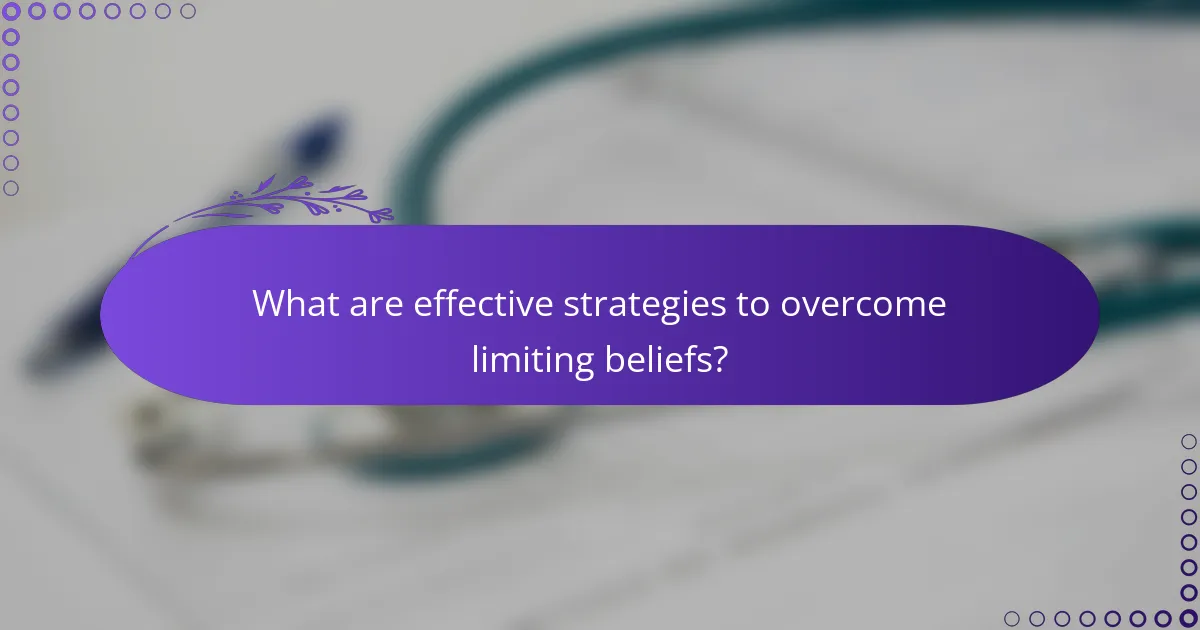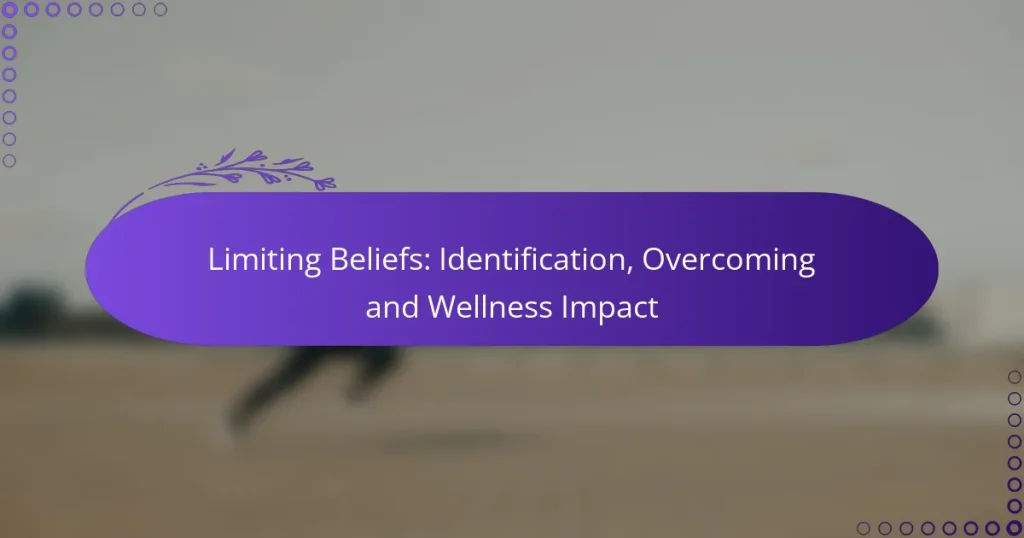Limiting beliefs are negative thoughts that can obstruct personal growth and well-being, often rooted in past experiences. By identifying and challenging these beliefs through strategies like cognitive behavioral therapy, affirmations, and visualization, individuals can foster a more positive mindset, significantly enhancing their overall wellness and quality of life.

How to identify limiting beliefs?
Identifying limiting beliefs involves recognizing negative thoughts that hinder personal growth and well-being. These beliefs often stem from past experiences and can manifest as self-doubt or fear of failure.
Self-reflection techniques
Self-reflection techniques help uncover limiting beliefs by encouraging introspection. Start by asking yourself questions about your fears and insecurities, such as “What do I believe about my abilities?” or “What holds me back from pursuing my goals?”
Consider setting aside time each week for self-reflection. This could be as simple as a quiet moment alone or a structured session where you analyze your thoughts and feelings. Look for patterns that reveal underlying beliefs.
Journaling prompts
Journaling prompts can effectively surface limiting beliefs by guiding your writing. Try prompts like “What negative thoughts do I have about myself?” or “When have I felt unworthy or incapable?”
Set a timer for 10-15 minutes and write without censoring your thoughts. Review your entries to identify recurring themes or beliefs that may be holding you back. This practice can help clarify your mindset and reveal areas for growth.
Guided meditation practices
Guided meditation practices can aid in identifying limiting beliefs by promoting mindfulness and self-awareness. Look for meditations focused on self-discovery or releasing negative thoughts.
During meditation, pay attention to any thoughts that arise and observe them without judgment. This can help you recognize beliefs that may be limiting your potential. Regular practice can enhance your ability to confront and challenge these beliefs over time.

What are effective strategies to overcome limiting beliefs?
Effective strategies to overcome limiting beliefs include cognitive behavioral therapy (CBT), affirmation practices, and visualization techniques. These methods help individuals identify and challenge negative thought patterns, fostering a more positive mindset and enhancing overall well-being.
Cognitive Behavioral Therapy (CBT)
Cognitive Behavioral Therapy (CBT) is a structured, time-limited approach that focuses on identifying and changing negative thought patterns. By working with a trained therapist, individuals can learn to recognize how their beliefs influence their emotions and behaviors, allowing them to develop healthier thought processes.
CBT typically involves techniques such as journaling, role-playing, and exposure therapy. These methods help individuals confront their limiting beliefs in a safe environment, gradually reducing their impact on daily life. Many people find that participating in CBT sessions for several weeks leads to significant improvements in their mental health.
Affirmation practices
Affirmation practices involve the repetition of positive statements that counteract limiting beliefs. By consistently affirming one’s strengths and capabilities, individuals can rewire their thinking and build self-confidence over time. This practice can be done daily, often in the morning or before challenging situations.
To create effective affirmations, focus on specific, present-tense statements that resonate personally. For example, instead of saying “I will be successful,” use “I am successful.” This small shift can enhance the effectiveness of the practice. It’s important to avoid common pitfalls, such as using vague or overly ambitious affirmations that may feel insincere.
Visualization techniques
Visualization techniques involve mentally picturing oneself achieving goals and overcoming obstacles. This practice can help reinforce positive beliefs and reduce anxiety associated with limiting thoughts. By vividly imagining success, individuals can create a sense of familiarity and confidence in their abilities.
To implement visualization, set aside a few minutes each day to close your eyes and visualize your desired outcomes. Focus on the details, including sights, sounds, and emotions. Regular practice can lead to improved motivation and a stronger belief in one’s potential, making it a valuable tool in overcoming limiting beliefs.

How do limiting beliefs impact wellness?
Limiting beliefs can significantly hinder overall wellness by creating mental barriers that affect emotional, physical, and social well-being. These beliefs often lead to negative thought patterns that can manifest in various aspects of life, ultimately reducing quality of life and personal fulfillment.
Effects on mental health
Limiting beliefs can contribute to anxiety, depression, and low self-esteem. When individuals hold negative views about their capabilities or worth, they may experience persistent feelings of inadequacy, leading to a cycle of negative thinking. For instance, believing one is not good enough for a promotion can prevent them from pursuing career advancement, reinforcing feelings of failure.
To combat these effects, individuals can practice cognitive restructuring, which involves identifying and challenging these beliefs. Techniques such as journaling or speaking with a therapist can help in reframing negative thoughts into more positive and empowering ones.
Influence on physical health
Limiting beliefs can also adversely affect physical health by influencing lifestyle choices and stress levels. For example, someone who believes they are incapable of maintaining a healthy diet may neglect nutrition, leading to weight gain and related health issues. Chronic stress from negative beliefs can also result in physical symptoms like headaches or fatigue.
To improve physical health, it is vital to adopt a mindset that encourages positive change. Setting achievable health goals and celebrating small victories can help shift beliefs towards a more positive outlook on health and wellness.
Impact on relationships
Limiting beliefs can create barriers in personal relationships by fostering mistrust and insecurity. For instance, believing that one is unlovable may lead to withdrawal from social interactions, causing isolation and loneliness. This belief can prevent individuals from forming meaningful connections with others.
To enhance relationships, individuals should focus on open communication and vulnerability. Engaging in self-reflection and seeking feedback from trusted friends can help challenge limiting beliefs and promote healthier, more fulfilling interactions.

What role does mindfulness play in overcoming limiting beliefs?
Mindfulness plays a crucial role in overcoming limiting beliefs by fostering awareness and acceptance of thoughts without judgment. This practice allows individuals to recognize negative thought patterns and replace them with more empowering beliefs, ultimately promoting mental well-being.
Mindfulness meditation benefits
Mindfulness meditation offers several benefits that can help individuals challenge and change limiting beliefs. Regular practice can reduce stress, enhance emotional regulation, and improve focus, which are essential for addressing negative thought patterns. Many practitioners report feeling more grounded and less reactive to their thoughts.
Additionally, mindfulness meditation can increase self-awareness, allowing individuals to identify specific beliefs that hold them back. This awareness is the first step in transforming those beliefs into more constructive ones.
Awareness of thought patterns
Being aware of thought patterns is vital for overcoming limiting beliefs. Mindfulness encourages individuals to observe their thoughts as they arise, helping them distinguish between helpful and unhelpful beliefs. This practice can reveal automatic negative thoughts that often go unnoticed.
To cultivate this awareness, individuals can practice techniques such as journaling or guided mindfulness exercises. These methods can help clarify which beliefs are limiting and provide insight into how they affect daily life. Recognizing these patterns is essential for creating lasting change and promoting overall wellness.

How can coaching help in overcoming limiting beliefs?
Coaching can significantly aid individuals in overcoming limiting beliefs by providing structured support and personalized strategies. Through targeted questioning and feedback, coaches help clients identify and challenge these beliefs, fostering a mindset shift that promotes personal growth and well-being.
Life coaching approaches
Life coaching employs various approaches to address limiting beliefs, including cognitive restructuring and goal-setting techniques. Coaches often use methods such as visualization, affirmations, and mindfulness to help clients reframe negative thoughts and develop a more positive outlook.
Another effective approach is the use of accountability, where coaches encourage clients to set specific, measurable goals. This helps individuals track their progress and reinforces their commitment to overcoming obstacles posed by limiting beliefs.
Success stories from coaching
Many individuals have experienced transformative changes through coaching by overcoming limiting beliefs. For instance, a client who believed they were not capable of public speaking may have worked with a coach to gradually build confidence, ultimately delivering a successful presentation.
Another success story involves a professional who felt unworthy of a promotion due to self-doubt. Through coaching, they learned to recognize their value and took actionable steps that led to a well-deserved advancement in their career.

What are common examples of limiting beliefs?
Limiting beliefs are negative thoughts or assumptions that hinder personal growth and success. Common examples include fears and self-doubt that can significantly impact one’s mental wellness and overall quality of life.
Fear of failure
Fear of failure is a prevalent limiting belief that can paralyze individuals from pursuing their goals. This fear often stems from past experiences or societal expectations, leading to avoidance of challenges and opportunities.
To overcome this fear, individuals can start by reframing their perspective on failure. Viewing failure as a learning opportunity rather than a setback can encourage risk-taking and personal development. Setting small, achievable goals can also help build confidence and reduce the fear associated with larger ambitions.
Imposter syndrome
Imposter syndrome is a psychological pattern where individuals doubt their accomplishments and fear being exposed as a “fraud.” This belief can lead to chronic self-doubt and anxiety, affecting both personal and professional life.
To combat imposter syndrome, it’s essential to acknowledge and celebrate achievements, no matter how small. Seeking feedback from trusted peers can provide a more objective view of one’s abilities. Additionally, practicing self-compassion and understanding that many people experience similar feelings can help mitigate the negative impact of this belief.


